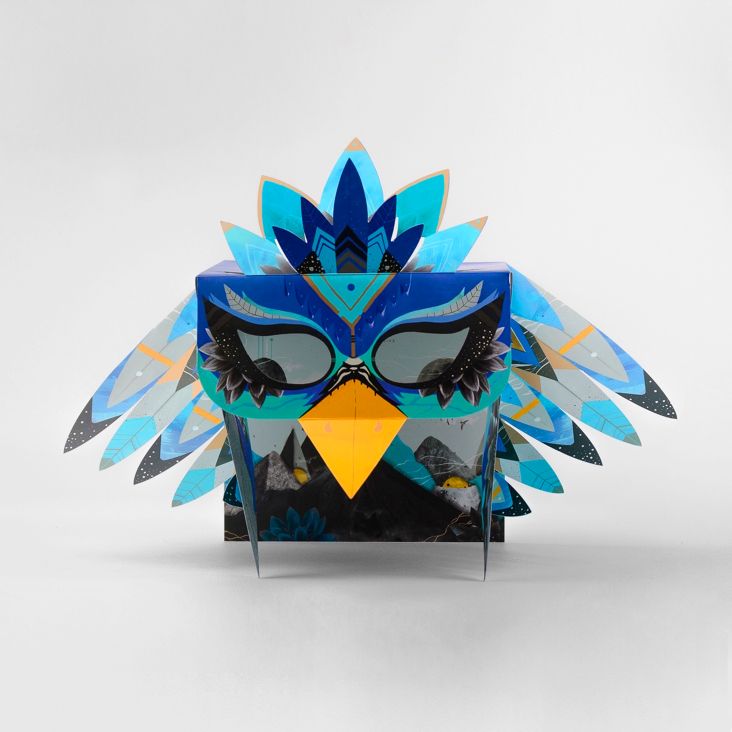Tips to help you survive the corporate world without losing your creative soul
Are you worried about losing your integrity as a creative in the corporate world? Designer and artist John S. Couch has launched a new book that might help.

Image licensed via Adobe Stock
In The Art of Creative Rebellion: How to Champion Creativity, Change Culture and Save Your Soul, he shares 28 straightforward principles he's identified to help you build confidence and live a creatively fulfilling life at the office.
John knows firsthand how tough it is to keep the creative juices flowing when faced with societal pressures to conform and bills to pay. With a career that has taken him from Wired magazine and CBS to Hulu, where he is currently vice president of Product Design, John is undoubtedly successful. Yet, as a young designer, he encountered his fair share of setbacks and periods of disillusionment – difficult experiences that a guiding hand may have helped him avoid or overcome more easily.
You can pre-order a copy of The Art of Creative Rebellion. In the meantime, we asked John if he could share a few tips with Creative Boom, so you can learn how to survive the corporate world without losing your soul.
What is the most common fear creative people have – and how can they overcome it?
First of all, I think all people are intrinsically creative. We were born creative, and we forget how to be our natural self. Children are naturally curious, and they draw without concern about the final product – the reward is in the actual process of making and the picture is just an artefact, a memento as it were, of the experience. As we get older, we tend to focus less on the making, the creative act, and more on the result – especially if we start to get paid for our creations. Consequently, we stress about the result more, and the enjoyment, the natural joy of creating, is diminished.
The most common fear is the sense of I-haven't-done-this-in-so long syndrome, and I will most likely embarrass myself in front of everyone, including myself. It's a sense of loss, a faded memory that we don't want to look at, and a feeling that whatever we create as an adult has to be good or even great. As Ira Glass so eloquently put it, there is a gap between your current skill and your taste. Most people have much better taste than ability, and they quickly become discouraged when they aren't brilliant out the gate.
Realising how potentially mediocre we are is the biggest fear. But the irony is, if you radically accept where you are right now, you can use it as a foundation and quickly build towards your taste if you commit to working on it daily. And focus on the process more than the attainment of the result.
What is the number one, non-negotiable thing we must do to nurture creativity?
Provide a safe space for creative thinking. Most work environments are somewhat fear-based. Time is money, you know, that kind of thing. And if an executive sees a creative person thinking through a problem, they may think he/she is merely frittering away valuable work time. The reality is that creativity requires contemplation and contemplation requires time, and that means you need to provide a sandbox for creative thinking.
You write about the importance of getting comfortable with discomfort. Why is it so vital, and what can we do to get out of our comfort zone?
The creative process is by nature uncomfortable because it is unknown at first, the tabula rasa, and we lack mastery for that which is unknown. In other words, we lack control. And humans hate not being in control.
Mastery is wonderful, and we should all strive for it. But mastery can also be constraining if it's not challenged. We fall into the same patterns, we do the same things exceptionally well, but then the well-worn grooves lead to stagnation. The world becomes small when we keep the same routines and route as we drive through life. Nothing new is learned.
Companies are intrinsically geared towards stability and operational effectiveness. When a company is first birthed, it's often by entrepreneurs who are, by nature, innovative. But the innovation becomes institutionalised quickly and innovation, being disruptive by nature, is suppressed. Innovation is uncomfortable but essential for success.
The dilemma for most companies is how to balance maintaining the core business (that keeps the lights on) as well as allowing for an internal group to disrupt their own business. These should run in parallel. Ninety per cent of the company is there to keep the trains running on time, and the other 10 per cent is there to future-proof the business by thinking about the future and creating innovative products that could temporarily put the core business at risk. But it's better to be one's own disruptor rather than the competition.
I believe in maintaining a "beginner's mind" as Zen master Suzuki Shunryu discusses in his seminal book Zen Mind, Beginner's Mind. In the beginner's mind, many possibilities exist.
We can do small things to get out of our comfort zone. For example, draw with your left hand if you are right-handed, and vice versa. Drive a different way to work. Keep a sketchbook and make yourself draw a three-minute sketch daily – the worse it is, the better. Decide to fail spectacularly at something that terrifies you – like doing stand-up comedy at an open mic night or speaking publicly at Toastmasters or going to Paris and ordering dinner in French at your favourite restaurant.
I love this quote by David Bowie: "If you feel safe in the area you're working in, you're not working in the right area. Always go a little further into the water than you feel you're capable of being in. Go a little bit out of your depth. And when you don't feel that your feet are quite touching the bottom, you're just about in the right place to do something exciting."
How do you assess an organisation's creative culture before applying for a position or accepting a job offer?
In my opinion, culture is the most important aspect of any business. After all, you are spending eight to 10 hours a day with these people, often more time than you spend with your own family and loved ones. Is the culture diverse? Is it fear-based or innovative?
Do your homework ahead of time. If possible, talk to people who work in the department ahead of time – take them to coffee or lunch. Look at Glassdoor. Spend time with the hiring manager, if possible. The job will most likely change, but you are working for him/her, and your relationship is incredibly important.
I have people working for me now who worked for me at past companies. One director worked for me in 2003 at another company, and another two directors worked with me seven years ago. Make no mistake, you are expendable to the company, no matter how essential you think you are. But your good relationships with your co-workers will go on after the current job. And they may become good friends as well.
It can be difficult for many people to know when it's time to leave a job, even if it's not fulfilling their creative potential. How do you decide to stay or leave a job, especially if you don’t have another position lined up?
Ah, this is a tough one that I struggle with as well. I always encourage my team to interview and explore opportunities at other companies. If they want to leave my team for a better opportunity, I'll help them with references and make sure they are going towards their ideal situation.
I also encourage the team to do something beyond their day job – yoga, triathlons, writing, art, whatever. It allows them to expand their interests and helps them feel creatively fulfilled. I remind the team that they are not their job title. They are not the company they work for. It’s a value exchange and can be, and should be, fulfilling for both sides but who you are is beyond strictly what you do for a living.
You should, ideally, leave a company to run towards opportunity rather than running away from what's bad. However, there are times that staying in a toxic environment is not an option. It's better to jump at times and realise that there's a massive relief in leaving a bad relationship. And, yes, you are in a relationship with a company. There are times you need counselling, and there are times you need a divorce.
But whatever your decision, take courage. Life opens up to those who dare.
How can do you keep disillusionment at bay if you're feeling creatively stuck?
When I'm creatively stuck, I seek inspiration through going to museums, travelling, and attending conferences. I might watch brilliant movies, go for a walk, or talk with friends (be careful who you associate with – they will either inspire you or be vampiric. You know the difference). I also read a lot.
Now those are the basic, easy things to do. Disillusionment is part of the creative process. Most of it, for me, is feeling stuck. But you hammer away by doing it daily. Quantity of anything leads to quality.
When I write, I start by simply, actively doing nothing. I meditate for 10 minutes. Then I sit and do nothing. No sketching. No social media. Nothing. Eventually, my head gets bored from the monkey mind ramblings, and I find myself writing. Writing with bravado, messy and horrible and after a page or so, I'm in the zone. And I can decide to delete the first messy part or keep it. Same with art. I move the hand around, allowing it to find what it finds. Sometimes I end up with scribbles. Sometimes I stumble onto something by accident that I'd never find consciously.
What can leaders do to cultivate creativity within their teams, and why does it make good business sense to do so?
Leaders have to exemplify that which they seek to instil in their team. We mirror our leaders. If we want a creative team, we have to be creative ourselves. Children emulate what their parents do, not what they say to do. If your dad is smoking cigarettes and tells you not to do it, well, you will probably not take his health advice as seriously as if you saw him working out daily.
A creative leader needs to set a robust and clear vision and work through his/her people. Hire well (for culture) and assume that the team is excellent – they will rise to that expectation.
How can young organisations (think start-ups) resist the tightly woven roles and responsibilities they initially shunned but frequently adopt as they grow?
I hate the invocation of "roles and responsibilities". Start-ups generally don't suffer from this as much as established, larger companies. Ostensibly companies do this to provide clarity, but I’ve found that it usually means that there is a lack of trust in the team. Look, everyone is capable of much more than their job description.
You are hired because of all of the things you can do but then, often, relegated to a specific arena that takes advantage of maybe 20% of your abilities. Why do companies and managers do this? I think it’s because of the fear of obsolescence. Many leaders are afraid of being found out that they aren’t what they project themselves to be – imposter syndrome. And they are terrified of being upstaged. These kinds of managers hire people who just a little less talented than they are.
What I do is hire people who are much, much more talented than I am. The value exchange between myself and the team is that they provide the talent, and I will provide the vision and block and tackle for them so they can do their best work.
Companies need to have a purpose. What do they truly stand for? Determine this and remind everyone that the mission is paramount. Have a bright north star and the need for constricting, soul-crushing roles and responsibilities will naturally die off. I’m not suggesting that everyone do anything they want – of course, do your core job, but if you can do more, then the company will get 3 to 4x the value of the employee. The employee will be engaged, and the company's bottom line benefits.




 by Tüpokompanii](https://www.creativeboom.com/upload/articles/58/58684538770fb5b428dc1882f7a732f153500153_732.jpg)


 using <a href="https://www.ohnotype.co/fonts/obviously" target="_blank">Obviously</a> by Oh No Type Co., Art Director, Brand & Creative—Spotify](https://www.creativeboom.com/upload/articles/6e/6ed31eddc26fa563f213fc76d6993dab9231ffe4_732.jpg)









](https://www.creativeboom.com/upload/articles/bf/bfce7804d3fddb08b654a5eeaf4ed411b7d4e7ca_732.jpeg)






